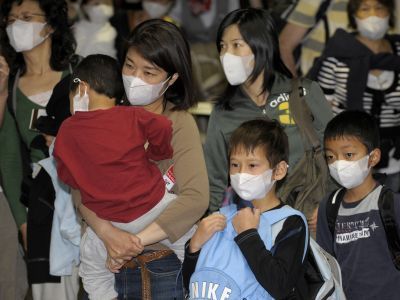Guidelines for controlling TB on airlines are a waste - study

Your support helps us to tell the story
From reproductive rights to climate change to Big Tech, The Independent is on the ground when the story is developing. Whether it's investigating the financials of Elon Musk's pro-Trump PAC or producing our latest documentary, 'The A Word', which shines a light on the American women fighting for reproductive rights, we know how important it is to parse out the facts from the messaging.
At such a critical moment in US history, we need reporters on the ground. Your donation allows us to keep sending journalists to speak to both sides of the story.
The Independent is trusted by Americans across the entire political spectrum. And unlike many other quality news outlets, we choose not to lock Americans out of our reporting and analysis with paywalls. We believe quality journalism should be available to everyone, paid for by those who can afford it.
Your support makes all the difference.World Health Organisation (WHO) guidelines for preventing the spread of TB through air travel are largely a waste of time and resources, an expert said on Sunday.
The WHO recommendations, set down in 2006 and 2008, urge health watchdogs to trace and screen passengers who have sat for longer than eight hours in rows adjacent to someone who has tested positive for pulmonary tuberculosis.
In addition, an individual with TB should be barred from all commercial air travel until clearing two tests to show he or she is no longer infectious.
But a review of the evidence, published in the journal Lancet Infectious Diseases, suggests there is little danger of contagion from air travel and tracing passengers is a burden for poor countries whose money would be better spent fighting TB at source.
TB specialist Ibrahim Abubakar of the University of East Anglia in eastern England looked at 13 investigations into 41 scares that tuberculosis had been transmitted by air travel.
A total of 2,761 passengers and crew were screened after potential contact with a TB case.
Only 10 of them showed up positive when using the tuberculin skin reaction test, which meant they had been latently infected by the microbe.
Yet none became actively infected, meaning they developed the symptoms of the disease.
Several factors combine to determine whether someone with TB, through coughing and wheezing, can transmit the dangerous lung bacterium to others, says the paper.
They include the bacterial load in the sputum, the duration and nature of contact, shared air space or ventilation and vulnerability of exposed people.
Most airliners, though, have high-efficiency air filtration designed to snare germs bigger than 0.3 nanometres - which means in principle that the TB bacterium, Mycobacterium tuberculosis, is caught.
In addition, cabin air is generally renewed more than 15 times an hour, which is more than the standard used in isolation rooms used for multidrug-resistant TB cases, says Abubakar.
"Although an airline cabin is a closed confined space, the cumulative duration of exposure is relative short compared with households or...other modes of transport where individuals might travel on the same route daily," he notes.
Another point, he says, is that TB has the best chance of infecting people when their immune systems are weakened by cancer, AIDS or other diseases. Yet yet most people who travel by air are relatively healthy.
Efforts to trace passengers deemed at risk were often fruitless and were costly, the paper adds.
In a case in 1992, doctors spent 600 hours and more than 25,000 dollars to investigate 152 passengers, but turned up no evidence at all of any transmission.
The report does not doubt the severity of the TB epidemic or the need to trace passengers in the event of a genuine emergency.
But, it says, there are grounds to doubt the current WHO guidelines.
"Resources might be better spent addressing other priorities of tuberculosis control and helping all achieve Millennium Development Goals related to tuberculosis."
Join our commenting forum
Join thought-provoking conversations, follow other Independent readers and see their replies
Comments